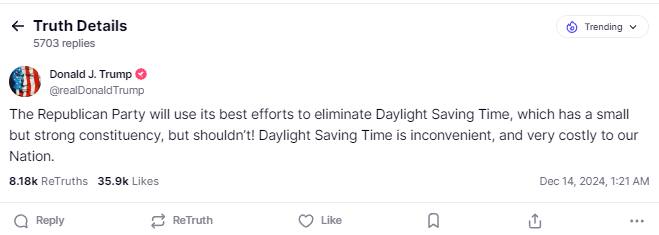Weeks before assuming office, US President-elect Donald Trump vowed to eliminate daylight saving time, calling it “inconvenient and costly” to the United States. In a post on Truth Social, Trump maintained that the Republican party will do everything to eliminate daylight saving. Trump’s remarks came after two of his top advisers, tech mogul Elon Musk and entrepreneur Vivek Ramaswamy, whom the president-elect has tapped to lead a new Department of Government Efficiency, floated a similar idea.
“The Republican Party will use its best efforts to eliminate Daylight Saving Time, which has a small but strong constituency, but shouldn’t! Daylight Saving Time is inconvenient, and very costly to our Nation,” the president-elect wrote on Truth Social on Friday. Last month, Musk also expressed his criticism for the time changes. “Looks like the people want to abolish the annoying time changes!” Musk wrote on X.

Ramaswamy replied to him, writing, “It’s inefficient & easy to change.” However, while responding to Musk’s post, Trump’s son shared an opposite position from his father’s. “Leave it daylight savings time always,” Trump Jr. wrote, adding in several emojis of the number “100,” signifying his agreement with Musk. Don Jr’s position over the matter was consistent with a bill the Senate passed in 2022 that would have made daylight saving time permanent beginning the following year.
Impact Shorts
More ShortsThe dilemma of DST
Daylight saving time (DST) is the practice of moving the clock ahead by one hour in the spring and back an hour in the autumn to make better use of natural daylight. According to the Pew Research Center, it is observed in a third of the world’s countries, including most of Europe. However, the move has been a matter of debate for decades.
Those who support DST say that brighter evenings are good, especially for those commuting from work or school, would reduce crime, conserve energy and even save lives in terms of reduced road accidents. Those who support standard time believe that it is better to have more light in the morning, paving the way for improved sleep cycles on darker evenings. They maintain that DST can be disorienting to sleep schedules.
Both sides argue that their preferred option is good for the economy. It is pertinent to note that the United States first began changing its clocks seasonally in 1918 during World War One, to conserve fuel. However, the move was unpopular among the farmers and was soon repealed after the war.
DST made a comeback during WW2 and was made permanent in 1966. The states at that time had the option to opt-out. Interestingly, the states of Arizona and Hawaii currently do not follow time changes under DST.
Not the first attempt
It is pertinent to note that Trump’s remarks don’t mark the first attempt to alter the biannual practice of changing clocks seasonally in the US. As mentioned before, the US Senate passed a bill in 2022 called the Sunshine Protection Act, to make DST permanent. However, the bill, introduced by Senator Marco Rubio, never made it to President Joe Biden’s desk.
Interestingly, Trump has tapped Rubio to be the next Secretary of State under his incoming administration. It’s unclear who would replace him if he is confirmed, but Lara Trump, the president-elect’s daughter-in-law, has been floated as a potential candidate.
With inputs from agencies.
)